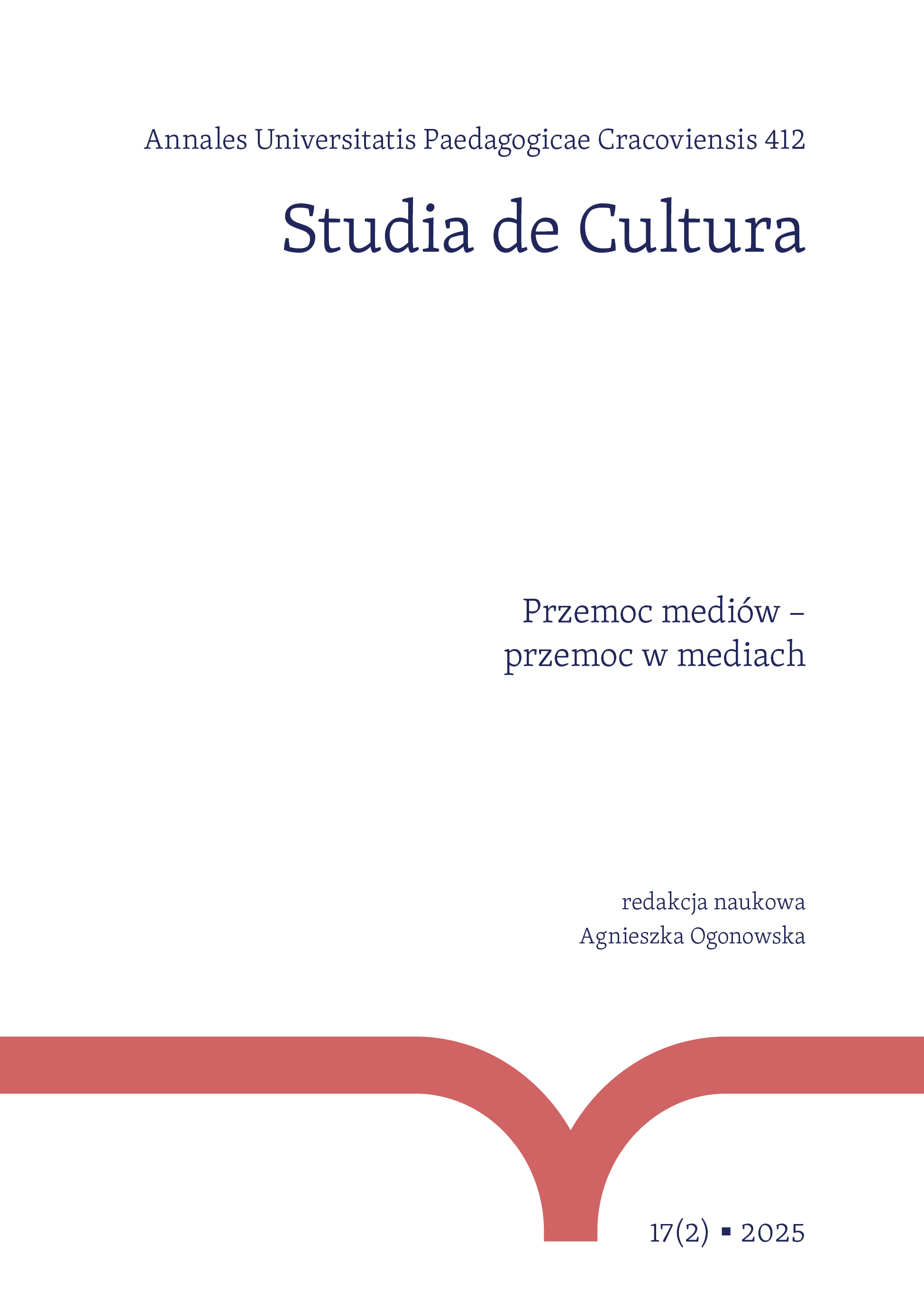Abstract
Black Mirror (2011–2023) is a British television drama that combines thriller and science fiction conventions. So far, six seasons have been released, sparking many discussions about how to portray the dystopian future of Western societies. However, the last season brought a sudden turn towards the nostalgic past and horror using folklore motifs. The author uses concepts from the theories of Jean Baudrillard (“simulacra,” “hyperreality”), Guy Debord (“society of the spectacle”), Erving Goffman (“theatrical metaphor”), Michel Foucault (“panopticon,” “biopolitics”) and Shoshana Zuboff (“surveillance capitalism”) to answer the question: what is the ideological evolution of the series and has it retained its critical potential?
References
Atwood Margaret. Rynek przyszłości. Historie które opowiadamy o nadchodzących czasach. In: Palące pytania. Eseje aktualne z lat 2004–2021. Michał Kłobukowski, Tomasz Dobrogoszcz (transl.). Warszawa.
View in Google Scholar
Baudrillard Jean. 2005a. Symulakry i symulacja. Sławomir Królak (transl.). Warszawa.
View in Google Scholar
Baudrillard Jean. 2005b. Duch terroryzmu. Requiem dla Twin Towers. Renata Lis (transl.). Warszawa.
View in Google Scholar
Baudrillard Jean. 2006. Społeczeństwo konsumpcyjne. Jego mity i struktury. Sławomir Królak (transl.). Warszawa.
View in Google Scholar
Baudrillard Jean. 2007. Wymiana symboliczna i śmierć. Sławomir Królak (transl.). Warszawa.
View in Google Scholar
Bernard Marr. “Chinese Social Credit Score: Utopian Big Data Bliss or Black Mirror on Steroids?.” Forbes. https://www.forbes.com/sites/bernardmarr/2019/01/21/chinese-social-credit-score-utopian-big-data-bliss-or-black-mirror-on-steroids (access: 20.09.2023).
View in Google Scholar
Cadwalladr Carole. 2025. “It is a Coup.” Substack. https://broligarchy.substack.com/p/it-is-a-coup?triedRedirect=true (access: 20.11.2024).
View in Google Scholar
Chris Cillizza. 2015. “Donald Trump’s Troll Game of Jeb Bush: A+.” Washington Post. https://www.washingtonpost.com/news/the-fix/wp/2015/09/08/donald-trumps-troll-game-of-jeb-bush-a/?utm_term=.d73873106f64 (access: 20.11.2024).
View in Google Scholar
Cirucci Angela M., Vacker Barry (eds.). 2018. Black Mirror and Critical Media Theory. Lanham.
View in Google Scholar
Debord Guy. 1998. Społeczeństwo spektaklu. Leszek Brogowski, Anka Ptaszkowska (transl.). Gdańsk.
View in Google Scholar
Debord Guy. 2006. Społeczeństwo spektaklu oraz Rozważania o społeczeństwie spektaklu. Mateusz Kwaterko (transl.). Warszawa.
View in Google Scholar
Dominiak Łukasz. 2012. “Urządzanie ciał, czyli władza w epoce biopolityki (Michel Foucault, «Bezpieczeństwo, terytorium, populacja», tłum. M. Herer, PWN, Warszawa 2010, ss. 513. oraz Michel Foucault, «Narodziny biopolityki», tłum. M. Herer, PWN, Warszawa 2011, ss. 417).” KLIO. Czasopismo poświęcone dziejom Polski i powszechnym vol. 20(1). 251–288.
View in Google Scholar
Foucalut Michel. 2012. Narodziny biopolityki. Michał Herer (transl.). Warszawa.
View in Google Scholar
Foucault Michel. 1993. Nadzorować i karać. Narodziny więzienia. Tadeusz Komendant (transl.). Warszawa.
View in Google Scholar
Foucault Michel. 2005. “Inne przestrzenie.” Agnieszka Rejniak- Majewska (transl.). Teksty Drugie no. 6. 117–125.
View in Google Scholar
Foucault Michel. 2010. Bezpieczeństwo, terytorium, populacja. Michał Herer (transl.). Warszawa.
View in Google Scholar
Goffman Erving. 2000. Człowiek w teatrze życia codziennego. Helena Datner- Śpiewak, Paweł Śpiewak (transl.). Warszawa.
View in Google Scholar
Kim Jin. 2021. “Algorithmic Intimacy, Prosthetic Memory, and Gamification in Black Mirror.” Journal of Popular Film and Television vol. 49(2). 109–118. DOI:10.1080/01956051.2021.1871584 (access: 20.11.2024).
View in Google Scholar
Leon- Boys Diana, Kristensen Morten Stinus. 2018. Race, Cyborgs, and the Pitfalls of Biopolitical Discourse In “Black Mirror’s” “Men Against Fire.” In: Black Mirror and Critical Media Theory. Angela M. Cirucci, Barry Vacker (eds.). Lanham.
View in Google Scholar
Peters Michael A. 2017. “Education in a Post- Truth World.” Educational Philosophy and Theory vol. 49(6). 564–566. DOI:10.1080/00131857.2016.1264114 (access: 20.11.2024).
View in Google Scholar
Rachel Veroff. 2017. “The French Philosopher Who Predicted Trump’s America.” Huffington Post. https://www.huffingtonpost.com/entry/the-french-philosopher-who-predicted-trumps-america_us_58da7c5de4b0e96354656eac (access: 20.09.2023).
View in Google Scholar
Tanne van Bree. 2016. Digital Hyperthymesia: On the Consequences of Living with Perfect Memory. In: Mind You: The Art of Ethics in the Information Age. Liisa Janssens (ed.). Amsterdam.
View in Google Scholar
Wójcik Grzegorz. 2017. “Rzeczywistość nie istnieje…? Media i nowoczesne technologie w społeczeństwie przyszłości na przykładzie serialu ‘Black Mirror’.” Annales Universitatis Paedagogicae Cracoviensis. Studia de Cultura vol. 8(2). 27–36.
View in Google Scholar

This work is licensed under a Creative Commons Attribution-NonCommercial 4.0 International License.
Copyright (c) 2025 Annales Universitatis Paedagogicae Cracoviensis. Studia de Cultura

